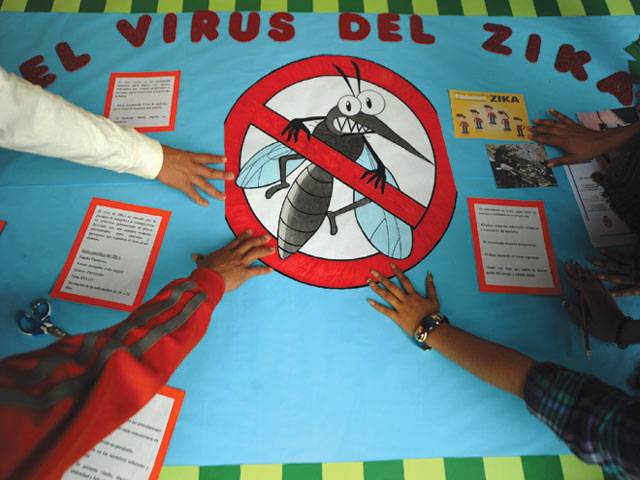Reuters
BOGOTA
More than 5,000 pregnant Colombian women are infected with the mosquito-borne Zika virus, the country’s national health institute said on Saturday, as the disease continues its rapid spread across the Americas. There are 31,555 cases of the disease in Colombia, the national health institute said in a epidemiology bulletin, among them 5,013 pregnant women. The disease has been linked to microcephaly, a condition marked by babies being born with an abnormally small head size that can result in developmental problems.
Much remains unknown about Zika, including whether the virus actually causes microcephaly. Brazil is investigating the potential link between Zika infections and more than 4,300 suspected cases of microcephaly. Meanwhile, a neurological disorder suspected of links to the mosquito-borne Zika virus is on the rise in Brazil, Colombia, El Salvador, Suriname and Venezuela, the World Health Organization (WHO) said on Saturday.
The rare Guillain-Barre syndrome, in which the body’s immune system attacks part of the nervous system, causes gradual weakness in the legs, arms and upper body and sometimes leads to total paralysis. “In the context of the Zika virus outbreak, Brazil, Colombia, El Salvador, Suriname and Venezuela have reported an increase of GBS (Guillain-Barre Syndrome),” the WHO said in a weekly report on Zika virus now circulating in 34 countries, including 26 in the Americas.
“The cause of the increase in GBS incidence observed in Brazil, Colombia, El Salvador and Suriname remains unknown, especially as dengue, chikungunya and Zika virus have all been circulating simultaneously in the Americas,” it added.
Investigations continue to determine the cause, WHO said, noting that there was no laboratory confirmation of Zika virus in patients with GBS in Colombia and El Salvador. Venezuela has reported 252 cases of Guillain-Barre occurring at the same time and place as Zika infections, it said. “Zika virus infection was confirmed for three of the GBS cases, including one fatal case.” Venezuela’s President Nicolas Maduro said on Thursday that three people had died of complications linked to Zika virus and that suspected cases of Zika had risen to 5,221.
Even in the best of settings, 3 to 5 percent of Guillain-Barre patients die from complications, which can include paralysis of the muscles that control breathing, blood infection, lung clots or cardiac arrest, according to the WHO.
In French Polynesia, all 42 GBS cases identified during the Zika virus outbreak in 2013-2014 tested positive for dengue and Zika virus infection, the WHO said.
There is no proven link between the Zika virus, the birth defect microcephaly and Guillain-Barre syndrome, but senior WHO expert Marie-Paule Kieny said on Friday that scientists suspected on and might be able to confirm it within weeks.
Microcephaly is a condition marked by a baby’s abnormally small head size, which can result in developmental problems.
“Prevention measures have become critical. There are concerns that the Zika virus may spread globally to environments where mosquitoes can live and breed,” the WHO said on Saturday.
Brazil is investigating the potential link between Zika infections and more than 4,300 suspected cases of microcephaly.
Researchers have confirmed more than 460 of these cases as microcephaly and identified evidence of Zika infection in 41 of these cases, but have not proven Zika can cause microcephaly.
Pregnant women should consider putting off travel to areas infected with the Zika virus as a precautionary measure, the WHO said on Friday.
“Brazil will not stand down from hosting the 2016 Olympic Games in Rio. The risk of contracting the Zika virus is minimal in August, the height of winter in the region and a time of year when mosquitoes are least active,” WHO said on Saturday, citing remarks made by member states at a private briefing last week.
Origin and global spread
This timeline charts the origin and spread of the Zika virus from its discovery in Uganda nearly 70 years ago:
1947 - Scientists researching yellow fever in Uganda’s Zika Forest identify the virus in a rhesus monkey
1948 - Virus recovered from Aedes africanus mosquito in Zika Forest
1952 - First human cases detected in Uganda and Tanzania
1954 - Virus found in Nigeria
1960s-1980s - Zika detected in mosquitoes and monkeys across equatorial Africa
1969-1983 - Zika found in equatorial Asia, including India, Indonesia, Malaysia and Pakistan
2007 - Zika spreads from Africa and Asia, first large outbreak on Pacific island of Yap
2012 - Researchers identify two distinct lineages of the virus, African and Asian
2013-2014 - Zika outbreaks in French Polynesia, Easter Island, the Cook Islands and New Caledonia. Retrospective analysis shows possible link to birth defects and severe neurological complications in babies in French Polynesia
March 2, 2015 - Brazil reports illness characterised by skin rash in northeastern states
April 29, 2015 - Brazilian samples test positive for Zika
July 17, 2015 - Brazil reports detection of neurological disorders in newborns associated with history of infection
Oct 5, 2015 - Cape Verde has cases of illness with skin rash
Oct 22, 2015 - Colombia confirms cases of Zika
Oct 30, 2015 - Brazil reports increase in microcephaly, abnormally small heads, among newborns
Nov 11, 2015 - Brazil declares public health emergency
Nov 2015-Jan 2016 - Cases reported in Suriname, Panama, El Salvador, Mexico, Guatemala, Paraguay, Venezuela, French Guiana, Martinique, Puerto Rico, Guyana, Ecuador, Barbados, Bolivia, Dominican Republic, Nicaragua, Curacao, Jamaica
Feb 1, 2016 - World Health Organization declares a public health emergency of international concern
Feb 2, 2016 - First case of Zika transmission in United States; local health officials say likely contracted through sex, not mosquito bite.
Feb 5, 2016- Outbreaks confirmed in 33 countries in the Americas
Feb 12, 2016 - World Health Organization says suspected link between Zika and the neurological disorders microcephaly and Guillain-Barre syndrome could be confirmed in weeks.
Feb 12, 2016 - Brazil investigating potential link between Zika infections and 4,314 suspected cases of microcephaly. Of those, 462 confirmed as microcephaly and 41 determined to be linked to virus.






